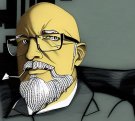What Is Poetry?
In a comment on a recently poem of mine (Its The Simple Things...) Tony Cook said the following:
"I like it very much as a piece of writing but I'm going to be difficult here and ask - is it really a poem? Isn't it just a very well put description of a relationship? Apart from the line breaks, what is poetic about it?"
I responded that from a traditional viewpoint, it wouldn't be considered poetry. However, I believe it certainly fits under the umbrella of modernist poetry.
If one types the question into Google, for instance, there are no end of different definitions and discourses on the subject.
Personally, I like the idea that poetry is an artistic creation using language. This opens up another very large can of worms - what is art? (Maybe it is all one can with different chambers). Either way, it is a slippery subject with a seemingly elusive definition.
I'd be interested to hear the opinions of others about this subject. Let the debate begin...




Author Page at the 'Zon